| Listing 1 - 10 of 24 | << page >> |
Sort by
|
Book
ISBN: 9788416872022 8416872023 8417288058 Year: 2016 Publisher: Huelva : Universidad de Huelva,
Abstract | Keywords | Export | Availability | Bookmark
 Loading...
Loading...Choose an application
- Reference Manager
- EndNote
- RefWorks (Direct export to RefWorks)
Religión. --- Eusebius, --- Criticism and interpretation. --- Caesarea, Eusebius of, --- Euseb, --- Eusèbe, --- Eusebio, --- Eusebios tou Pamphilou, --- Eusebios, --- Eusebius Pamphili, --- Eusebj Pamffil, --- Evseviĭ, --- Ewsebios Pampʻigheay, --- Qayṣarī, Yūsābiyūs, --- Yūsābiyūs al-Qaṣarī, --- Eusevios, --- Eusevios Kaisareias,
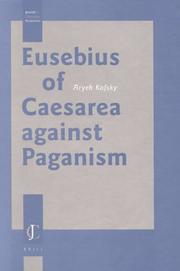
ISSN: 13882074 ISBN: 9004116427 9004421408 9789004116429 Year: 2000 Volume: v. 3 Publisher: Leiden ; Boston ; Koln : Brill,
Abstract | Keywords | Export | Availability | Bookmark
 Loading...
Loading...Choose an application
- Reference Manager
- EndNote
- RefWorks (Direct export to RefWorks)
Dealing with the subject of apologetics and polemics against the pagans in Eusebius of Caesarea (c. 260-340), this volume discusses his response to the vigorous political, cultural and religious campaign launched against Christianity in his time. The first part of the book examines the background for Eusebius' apologetic enterprise and his early apologetic writings. The second and main part of the study analyzes major topics in Eusebius' great two-part apologetic work, the Praeparatio Evangelica and the Demonstratio Evangelica , such as the concept of Christian prehistory, prophecy and miracles. The last part deals with Eusebius' tactics and rhetoric and the place of Porphyry - the outstanding pagan polemicist against Christianity - in Eusebius' work. This part closes with a discussion of Eusebius' final apologetic statement in his work The Theophany , reflecting already the recent triumph of Christianity. This publication has also been published in paperback, please click here for details.
Apologetics --- Apologétique --- History --- Histoire --- Eusebius, --- 276 =75 EUSEBIUS CAESARIENSIS --- Griekse patrologie--EUSEBIUS CAESARIENSIS --- Apologétique --- Caesarea, Eusebius of, --- Euseb, --- Eusèbe, --- Eusebio, --- Eusebios tou Pamphilou, --- Eusebios, --- Eusebius Pamphili, --- Eusebj Pamffil, --- Evseviĭ, --- Ewsebios Pampʻigheay, --- Qayṣarī, Yūsābiyūs, --- Yūsābiyūs al-Qaṣarī, --- Eusevios, --- Eusevios Kaisareias,
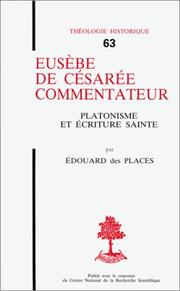
ISBN: 2701010330 2701016770 9782701010335 Year: 1982 Volume: 63 Publisher: Paris Beauchesne
Abstract | Keywords | Export | Availability | Bookmark
 Loading...
Loading...Choose an application
- Reference Manager
- EndNote
- RefWorks (Direct export to RefWorks)
Philosophy, Ancient --- Eusebius, --- Bible --- Criticism, interpretation, etc. --- History --- #GOSA:II.P.EUS-C.O --- #GOSA:II.P.EUS-C.M --- Ancient philosophy --- Greek philosophy --- Philosophy, Greek --- Philosophy, Roman --- Roman philosophy --- Eusebius of Caesarea, Bishop of Caesarea --- Caesarea, Eusebius of, --- Euseb, --- Eusèbe, --- Eusebio, --- Eusebios tou Pamphilou, --- Eusebios, --- Eusebius Pamphili, --- Eusebj Pamffil, --- Evseviĭ, --- Ewsebios Pampʻigheay, --- Qayṣarī, Yūsābiyūs, --- Yūsābiyūs al-Qaṣarī, --- Eusevios, --- Eusevios Kaisareias, --- Biblia --- Eusebius, - of Caesarea, Bishop of Caesarea, - ca. 260-ca. 340
Book
ISBN: 3746203880 9783746203881 Year: 1991 Volume: 58 Publisher: Leipzig St. Benno
Abstract | Keywords | Export | Availability | Bookmark
 Loading...
Loading...Choose an application
- Reference Manager
- EndNote
- RefWorks (Direct export to RefWorks)
Trinity --- Arianism. --- History of doctrines --- 276 =75 MARCELLUS ANCYRANUS --- Arianism --- -Theology, Doctrinal --- Triads (Philosophy) --- Appropriation (Christian theology) --- God (Christianity) --- Godhead (Mormon theology) --- Holy Spirit --- Trinities --- Tritheism --- Antitrinitarianism --- Christian heresies --- Homoousian controversy --- Griekse patrologie--MARCELLUS ANCYRANUS --- -History --- Eusebius of Caesarea, Bishop of Caesarea --- Marcellus of Ankara, Bishop of Ankara --- -Griekse patrologie--MARCELLUS ANCYRANUS --- -Eusebius of Caesarea, Bishop of Caesarea --- Eusebius, --- Marcellus, --- Markell, --- Caesarea, Eusebius of, --- Euseb, --- Eusèbe, --- Eusebio, --- Eusebios tou Pamphilou, --- Eusebios, --- Eusebius Pamphili, --- Eusebj Pamffil, --- Evseviĭ, --- Ewsebios Pampʻigheay, --- Qayṣarī, Yūsābiyūs, --- Yūsābiyūs al-Qaṣarī, --- Eusevios, --- Eusevios Kaisareias, --- History --- Marcellus --- Markell --- Marcelo --- Marcellus Ancyranus --- Trinity - History of doctrines - Early church, ca 30-600
Book
ISSN: 05534003 ISBN: 9783110195729 3110195720 1282196537 9786612196539 3110205661 9783110205664 Year: 2008 Volume: 63 Publisher: Berlin New York : Walter de Gruyter,
Abstract | Keywords | Export | Availability | Bookmark
 Loading...
Loading...Choose an application
- Reference Manager
- EndNote
- RefWorks (Direct export to RefWorks)
In seiner Kirchengeschichte vom Beginn des 4. Jh.s skizziert Eusebius von Cäsarea (ca. 260-ca. 340) erstmals umfassend die Geschichte der Christenheit von ihren Anfängen bis in seine eigene Zeit. Breiten Raum nimmt dabei die Darstellung des Kampfes gegen aufkeimende Häresien ein. Für sein Werk greift Eusebius auf älteste Quellen zurück, die uns heute z. T. nur noch aus seiner historia ecclesiastica bekannt sind. Die vorliegende Untersuchung analysiert in ihrem ersten Teil minutiös die 26 Häresiedarstellungen in Eusebius' Kirchengeschichte. Großer Wert wird dabei auf die formalen und inhaltlichen Rezeptionskriterien Eusebius' sowie seinen redaktionellen Umgang mit Quellentexten und Traditionen gelegt. Es wird gezeigt, wie Eusebius seine Quellen auswählt, abgrenzt und für seine Konzeption nutzbar macht.Der zweite Teil der Arbeit stellt die eusebianische Häreseographie systematisch dar und beschreibt deren Funktion innerhalb seiner Kirchengeschichtsschreibung. Vor dem Hintergrund der antiken Historiographie sowie der altkirchlichen Häreseologie werden die Besonderheiten der eusebianischen Vorgehensweise betrachtet und abschließend in ihrer Eigenständigkeit gewürdigt.
Christian heresies --- History --- Eusebius, --- 276 =75 EUSEBIUS CAESARIENSIS --- Griekse patrologie--EUSEBIUS CAESARIENSIS --- Christian heresies -- History -- Early church, ca. 30-600. --- Heresies, Christian. --- Caesarea, Eusebius of, --- Euseb, --- Eusèbe, --- Eusebio, --- Eusebios tou Pamphilou, --- Eusebios, --- Eusebius Pamphili, --- Eusebj Pamffil, --- Evseviĭ, --- Ewsebios Pampʻigheay, --- Qayṣarī, Yūsābiyūs, --- Yūsābiyūs al-Qaṣarī, --- Eusevios, --- Eusevios Kaisareias, --- Historia ecclesiastica. --- Christian heresies - History - Early church, ca 30-600 --- Eusebius ep. Caesariensis --- Eusebius, - of Caesarea, Bishop of Caesarea, - ca. 260-ca. 340 --- Church History. --- Eusebius of Caesarea. --- Heresiology. --- Historiography. --- History of Heresy. --- Eusèbe de Césarée (0265?-0340) --- Eusèbe de Césarée (0265?-0340). Histoire ecclésiastique --- Hérésies chrétiennes --- Hérésies juives --- Et l'hérésie --- 30-600 (Église primitive)
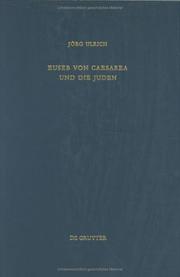
ISSN: 05534003 ISBN: 3110162334 1306272440 3110802112 9783110162332 Year: 1998 Volume: 49 Publisher: Berlin de Gruyter
Abstract | Keywords | Export | Availability | Bookmark
 Loading...
Loading...Choose an application
- Reference Manager
- EndNote
- RefWorks (Direct export to RefWorks)
296*811 --- 276 =75 EUSEBIUS CAESARIENSIS --- Judaism (Christian theology) --- -296*811 Antisemitisme--in oudheid en middeleeuwen --- Antisemitisme--in oudheid en middeleeuwen --- Griekse patrologie--EUSEBIUS CAESARIENSIS --- History of doctrines --- Eusebius of Caesarea, Bishop of Caesarea --- -Views on Christology --- 296*811 Antisemitisme--in oudheid en middeleeuwen --- Eusebius, --- Caesarea, Eusebius of, --- Euseb, --- Eusèbe, --- Eusebio, --- Eusebios tou Pamphilou, --- Eusebios, --- Eusebius Pamphili, --- Eusebj Pamffil, --- Evseviĭ, --- Ewsebios Pampʻigheay, --- Qayṣarī, Yūsābiyūs, --- Yūsābiyūs al-Qaṣarī, --- Eusevios, --- Eusevios Kaisareias, --- Eusebius of Caesarea --- Views on judaism --- Judaism --- History --- Post-exilic period, 586 B.C.-210 A.D. --- Historiography --- Judaism (Christian theology) - History of doctrines - Early church, ca. 30-600.
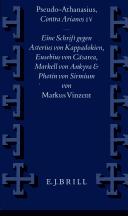
ISSN: 0920623X ISBN: 9004106863 9004313036 9789004106864 Year: 1996 Volume: 36 Publisher: Leiden Brill
Abstract | Keywords | Export | Availability | Bookmark
 Loading...
Loading...Choose an application
- Reference Manager
- EndNote
- RefWorks (Direct export to RefWorks)
Until now the period following the Council of Nicea has remained a dark age of early Christian history. This is partly due to the fact that Eusebius' last and important works, Contra Marcellum and De Ecclesiastica Theologia , have not sufficiently been studied. Comparatively little interest has also been given to the Pseudo-Athanasian text Contra Arianos IV . Careful study and comparison of these works against the background of the post-Nicene debate between Asterius, Marcellus, Eusebius and Photinus, has revealed that (as A. Stegmann already proposed in 1917) Contra Arianos IV was written in about 340 and formed a Nicene critique of Marcellus, his pupil and opponents. Therefore, Stegmann's suggestion of the authorship of Apolinarius of Laodicea needs further investigation. This study on Contra Arianos IV sheds new light on the years between Nicea and the synods of Rome and Antioch (340/341).
Arianism --- Theology --- Arianisme --- Théologie --- Controversial literature --- Early works to 1800 --- History --- Ouvrages de controverse --- Ouvrages avant 1800 --- Histoire --- Apollinaris, --- Asterius, --- Eusebius, --- Marcellus, --- Photinus, --- Early works to 1800. --- -Antitrinitarianism --- Christian heresies --- Homoousian controversy --- -Early works to 1800 --- Apollinaris Bishop of Laodicea --- Asterius the Sophist --- Eusebius of Caesarea, Bishop of Caesarea --- Marcellus of Ankara, Bishop of Ankara --- Photinus Bishop of Sirmium --- -Controversial literature --- Théologie --- Antitrinitarianism --- Controversial literature&delete& --- Photin, --- Markell, --- Caesarea, Eusebius of, --- Euseb, --- Eusèbe, --- Eusebio, --- Eusebios tou Pamphilou, --- Eusebios, --- Eusebius Pamphili, --- Eusebj Pamffil, --- Evseviĭ, --- Ewsebios Pampʻigheay, --- Qayṣarī, Yūsābiyūs, --- Yūsābiyūs al-Qaṣarī, --- Eusevios, --- Eusevios Kaisareias, --- Asterios, --- Apolinarios, --- Apolinarius, --- Apollinaire, --- Apollinarius, --- Apollinaris Laodicenus --- Apollinaris --- Apollinarius Laodicensis --- Arianism. --- Early church --- Marcellus --- Markell --- Marcelo --- Marcellus Ancyranus --- Arianism - Controversial literature - Early works to 1800.

ISBN: 9004131329 9789004131323 142371105X 9781423711056 9047402316 9789047402312 128046755X 9781280467554 9786610467556 6610467552 Year: 2003 Volume: 67 Publisher: Leiden Boston Brill
Abstract | Keywords | Export | Availability | Bookmark
 Loading...
Loading...Choose an application
- Reference Manager
- EndNote
- RefWorks (Direct export to RefWorks)
This volume reconstructs the contents of the library in Roman Palestine of Eusebius of Caesarea (ca. 265-339) by examining Eusebius’ major works, the Ecclesiastical History , Chronicon , Preparation for the Gospel , and Life of Constantine . After surveying the history of the library from its origins as an ecclesiastical archive and its true foundation by Origen of Alexandria to its disappearance in the seventh century, it discusses how Eusebius used his sources and then examines what specific works were available in the library in chapters devoted to philosophical works, poetry and rhetoric, histories, Jewish and Christian works, and contemporary documents. The book ends with a useful list of the contents of the library.
Libraries --- History --- Eusebius, --- Books and reading. --- Books and reading --- Eusebius of Caesarea --- Israel --- Caesarea --- To 400 --- 276 =75 EUSEBIUS CAESARIENSIS --- Griekse patrologie--EUSEBIUS CAESARIENSIS --- Caesarea, Eusebius of, --- Euseb, --- Eusèbe, --- Eusebio, --- Eusebios tou Pamphilou, --- Eusebios, --- Eusebius Pamphili, --- Eusebj Pamffil, --- Evseviĭ, --- Ewsebios Pampʻigheay, --- Qayṣarī, Yūsābiyūs, --- Yūsābiyūs al-Qaṣarī, --- Eusevios, --- Eusevios Kaisareias, --- Documentation --- Public institutions --- Librarians --- Libraries. --- Appraisal of books --- Books --- Choice of books --- Evaluation of literature --- Literature --- Reading and books --- Reading, Choice of --- Reading habits --- Reading public --- Reading --- Reading interests --- Reading promotion --- Appraisal --- Evaluation --- Libraries - Israel - Caesarea - History - To 400 --- Eusebius, - of Caesarea, Bishop of Caesarea, - ca. 260-ca. 340 - Books and reading --- Eusebius, - of Caesarea, Bishop of Caesarea, - ca. 260-ca. 340
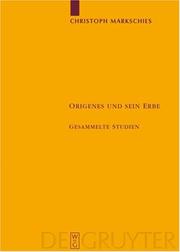
ISSN: 00823589 ISBN: 9783110192780 3110192780 3110927411 Year: 2007 Volume: 160 Publisher: Berlin de Gruyter
Abstract | Keywords | Export | Availability | Bookmark
 Loading...
Loading...Choose an application
- Reference Manager
- EndNote
- RefWorks (Direct export to RefWorks)
Christoph Markschies legt hier gesammelte Beiträge zu dem christlichen Theologen Origenes (gestorben ca. 254 n. Chr.) vor, der als der erste wissenschaftlich arbeitende Denker des Christentums gelten kann. Die Aufsätze behandeln philologische Probleme von Texten des Origenes, untersuchen theologische Vorstellungen wie beispielsweise die Gotteslehre des alexandrinischen Theologen und nehmen mit dem Kirchenhistoriker Eusebius und dem Mailänder Bischof Ambrosius zwei maßgebliche Theologen des vierten Jahrhunderts in den Blick, die im Osten wie Westen das Erbe des Origenes weitertradierten. In this volume, Christoph Markschies presents a collection of papers on Origen, the Christian theologian from Alexandria (died approx. 254 AD), who is regarded as the first Christian thinker to work in a rigorous and systematic philosophical manner. The papers in the volume treat philological problems presented by Origen's texts, examine theological ideas he developed, and consider the parts played by Eusebius, the Church historian, and Ambrosius, Bishop of Milan, who as two key theologians from the fourth century continued the traditions established by Origen in both East and West.
Fathers of the church. --- Church --- Theology --- Pères de l'Eglise --- Eglise --- Théologie --- History of doctrines --- Primitive and early church, ca. 30-600. --- History --- Histoire des doctrines --- Histoire --- Origen. --- Eusebius, --- Ambrose, --- 276 =75 ORIGENES --- Griekse patrologie--ORIGENES --- Ambrogio, --- Ambroise, --- Ambrosio, --- Ambrosius Mediolanensis, --- Ambrosius, --- Ambrosius von Mailand, --- Amvrosīĭ, --- Aurelio Ambrogio, --- Aurelius Ambrosius, --- Caesarea, Eusebius of, --- Euseb, --- Eusèbe, --- Eusebio, --- Eusebios tou Pamphilou, --- Eusebios, --- Eusebius Pamphili, --- Eusebj Pamffil, --- Evseviĭ, --- Ewsebios Pampʻigheay, --- Qayṣarī, Yūsābiyūs, --- Yūsābiyūs al-Qaṣarī, --- Eusevios, --- Eusevios Kaisareias, --- Adamantius, --- Oregenes Adamantius, --- Origene --- Origenes Adamantius, --- Origenes, --- Origenis --- Orygenes --- Ūrījānūs --- Pères de l'Eglise --- Théologie --- Church - History of doctrines - Early church, ca. 30-600 --- Theology - History - Early church, ca. 30-600 --- Origenes --- Ambrogio --- Ambroise --- Ambrose --- Ambrosio --- Ambrosius Mediolanensis --- Ambrosius --- Ambrosius von Mailand --- Amvrosīĭ --- Aurelio Ambrogio --- Aurelius Ambrosius --- Early Church. --- Fathers of the Church.
Book
ISBN: 9780674073296 0674073290 Year: 2013 Volume: 60 Publisher: Washington, D.C. Harvard University. Center for Hellenic Studies
Abstract | Keywords | Export | Availability | Bookmark
 Loading...
Loading...Choose an application
- Reference Manager
- EndNote
- RefWorks (Direct export to RefWorks)
Eusebius of Caesarea was one of the most significant and voluminous contributors to the development of late antique literary culture. Despite his significance, Eusebius has tended to receive attention more as a source for histories of early Christianity and the Constantinian empire than as a writer and thinker in his own right. He was a compiler and copyist of pagan and Christian texts, collator of a massive chronographical work, commentator on scriptural texts, author of apologetic, historical, educational, and biographical works, and custodian of one of the greatest libraries in the ancient world. As such, Eusebius merits a primary place in our appreciation of the literary culture of late antiquity for both his self-conscious conveyance of multiple traditions and his fostering of innovative literary and intellectual trajectories. By focusing on the full range of Eusebius's literary corpus, the collection of essays in Eusebius of Caesarea offers new and innovative studies that will change the ways classicists, theologians, and ancient historians think about this major figure.
Christian literature, Early --- Littérature chrétienne primitive --- History and criticism. --- Histoire et critique --- Eusebius, --- History and criticism --- Criticism and interpretation --- 276 =75 EUSEBIUS CAESARIENSIS --- Griekse patrologie--EUSEBIUS CAESARIENSIS --- Caesarea, Eusebius of, --- Euseb, --- Eusèbe, --- Eusebio, --- Eusebios tou Pamphilou, --- Eusebios, --- Eusebius Pamphili, --- Eusebj Pamffil, --- Evseviĭ, --- Ewsebios Pampʻigheay, --- Qayṣarī, Yūsābiyūs, --- Yūsābiyūs al-Qaṣarī, --- Eusevios, --- Eusevios Kaisareias, --- Criticism and interpretation. --- Histoire et critique. --- Eusèbe de Césarée --- Eusebius --- Eusèbe, --- Critique et interprétation. --- Eusèbe de Césarée, --- Littérature chrétienne primitive --- Christian literature, Early - History and criticism --- Eusebius ep. Caesariensis --- Constantin empereur --- Eusebius, - of Caesarea, Bishop of Caesarea, - ca. 260-ca. 340 - Criticism and interpretation --- Eusebius, - of Caesarea, Bishop of Caesarea, - ca. 260-ca. 340
| Listing 1 - 10 of 24 | << page >> |
Sort by
|

 Search
Search Feedback
Feedback About UniCat
About UniCat  Help
Help News
News